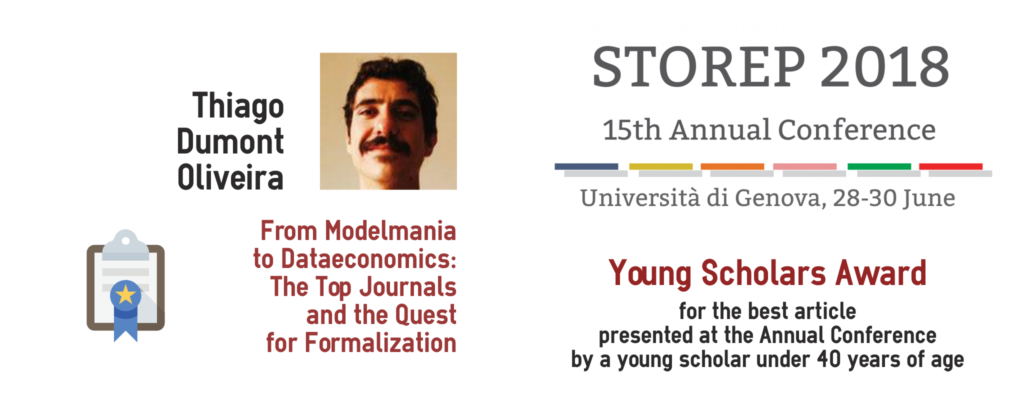Young Scholars STOREP Award 2018: Thiago Dumont Oliveira
The Young Scholar STOREP Award (500€) is conferred to the author (a young scholar under 40 years of age) of the best article presented at the Annual Conference. The article can focus on any topic of relevance to the history of political economy or to the main theme of the Conference, but it can also discuss any issue in contemporary economic analysis and policy whose conclusions are spelled out in contrast or continuity with past theoretical standpoints.
The STOREP 2018 Award (15th STOREP Annual Conference, Università di Genova) has been conferred to:
Thiago Dumont Oliveira (Università di Siena)
author of:
From Modelmania to Dataeconomics:
The Top Journals and the Quest for Formalization
Paper published in the STOREPapers series, 2/2018 [Download]
Motivation
The paper contributes to the analysis of both recent trends in economics and changes in general research interests of economists over time. Specific quantitative and textual analyses have been carried out to isolate trends in single sub-fields and methods in economics that help to explain the formalization of contemporary economics.
Thiago Dumont Oliveira investigates the hegemony of top journals in shaping economic discourse and in contributing to a greater homogenization of the methodology of economics and the concentration of research interests and agendas. The paper clearly demonstrates how leading journals (namely The American Economic Review, Journal of Political Economy and The Quarterly Journal of Economics) played the role of gate-keepers of economic discourse mainly in the direction of increasing the use of mathematical and quantitative methods (in particular between 1940 and 1980) and of rising applied analyses since 1955. Moreover, the co-word analysis of abstracts from fifteen journals between 1990 and 2017 shows that the shift from theoretical to applied research has intensified in recent years.
The paper gives an interesting perspective on the debate about the tyranny of the top journals (see Heckman and Moktan, 2018) providing a historical perspective of the shifting boundaries of economics and its implications for the future of economics, shaping research agenda for many young economists. The paper is well argued, accurate in references to the literature and rigorous from a methodological point of view. It deals with a topic of extreme interest in the field of the sociology of the economics profession with innovative methodology, in a particularly clear and effective way, thereby making a valuable contribution to the extant literature.

